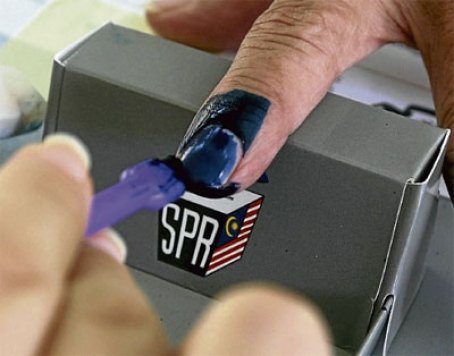Trust is central to democracy
Professor Tan Sri Dato' Dzulkifli Abdul Razak
Learning Curve: Perspective
New Sunday Times - 19-05-2013
SINCE the early days of implementing autonomy on campus, the emphasis has always been on "trust" as a key element to make it happen.
Today, "full autonomy" is still very much found wanting, and so is "trust" by implication.

The demand for inedible ink is clearly an expression of prevailing distrust among some quarters.
The idea that autonomy can be delivered in segments over a five-year period -- as being advocated lately -- falls through because it also assumes that "trust" can be divided in similar ways. This is absurd, hence the stalemate we have until today!
In the long run, the lack of "trust" will turn into "distrust" and the situation will further deteriorate.
In other words, it borders on a breakdown of communication, and tensions are bound to increase subsequently.
The same can be said of the democratic process, where "trust" is regarded as central. For starters, no one will want to be involved in such an elaborate procedure if they do not trust it in the first place.
Democracy can be likened to a form of autonomy in as far as freedom of expression is concerned.
Freedom of expression, an important platform for a successful electoral exercise, is regarded as a basic "right" of every citizen.
This implicitly suggests that the level of "trust" placed on all parties involved must also be very high -- unquestionable, in fact.
However, this may not be the case all the time, and it makes a situation vulnerable and uncertain. Instead of building "trust", it seems much easier to do the reverse.
It is deemed a far more effective way to garner votes when the electorate harbour some distrust of the contending party.
As a result, the outcome of an election is not only influenced by the number of votes cast but also by a lingering state of "(un)trustworthiness" that bears on it.
Trustworthiness is non-tangible. It can never be satisfactorily verified, resolved or explained to convincingly persuade those who insist otherwise.
Therefore, the state of "(un)trustworthiness" continues to jeopardise the decision of the majority during an election.
It is even more unfortunate when distrust continues well after the election results are computed and announced.
The impact is worse when suspicions translate into a proposition that leans on undemocratic means. Yet again it is a consequence of a breakdown of communication, fuelling even greater tensions shrouded by distrust.
The demand for inedible ink is clearly an expression of prevailing distrust among some quarters. Although its use was eventually agreed to by all parties concerned, it was still a contentious issue.
That questions of its effectiveness are raised post-election is further indication that the state of distrust has not diminished.
This is not to say that all elections are perfect, and perfectly executed. There are flaws even in the best of democracies. But the consensus is to allow such mistakes to be rectified in a democratic way as well.
Otherwise, the election process is a waste of time and resources as the "distrust strategy" is a convenient way out for any losing or unsatisfied persons or parties.
At times, it can be an act of desperation!
We then come full circle: Why hold an election when "trust" is at stake to start with? Resolving this question is certainly not easy as it is also a reflection of the state of maturity of the sovereignty.
Similarly, any undemocratic way to assume power using the "trust" issue still in limbo can only result in a more negative consequence.
With or without democracy, a high level of "trust" is a prerequisite for a more civilised and cultured way of life that we must strive for, notwithstanding our goal of becoming a developed nation by 2020.
In the pursuit of this aim, over reliance on Key Performance Indexes is an unintentional consequence of our failure to build genuine trust beyond political speak!
If we are serious about "national reconciliation", let us begin with the subject of "trust" and how to achieve agreement based on it.
The truth is that nothing works if there is no trust. Trust me!
- The writer is the vice-chancellor of the Albukhary International University
